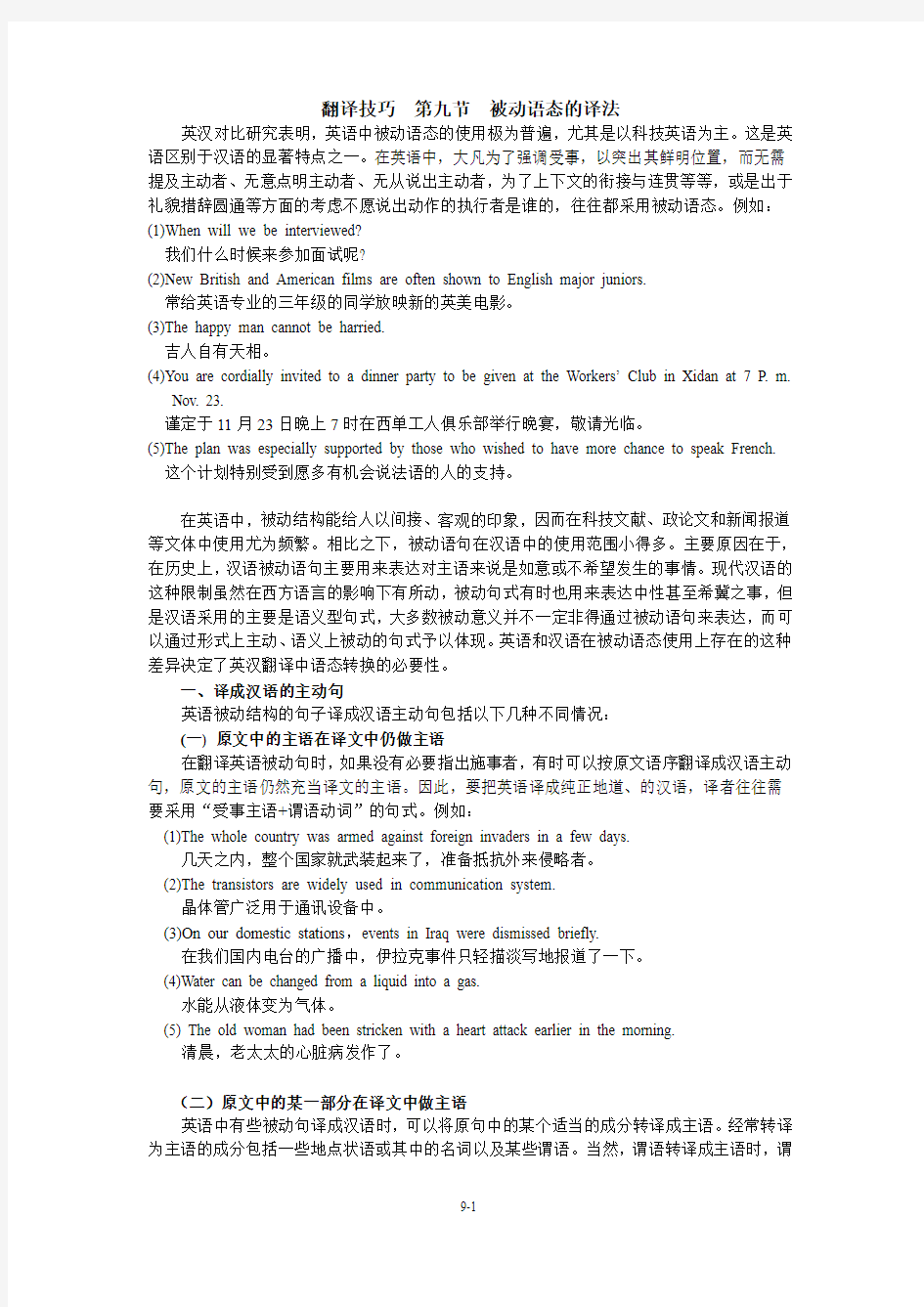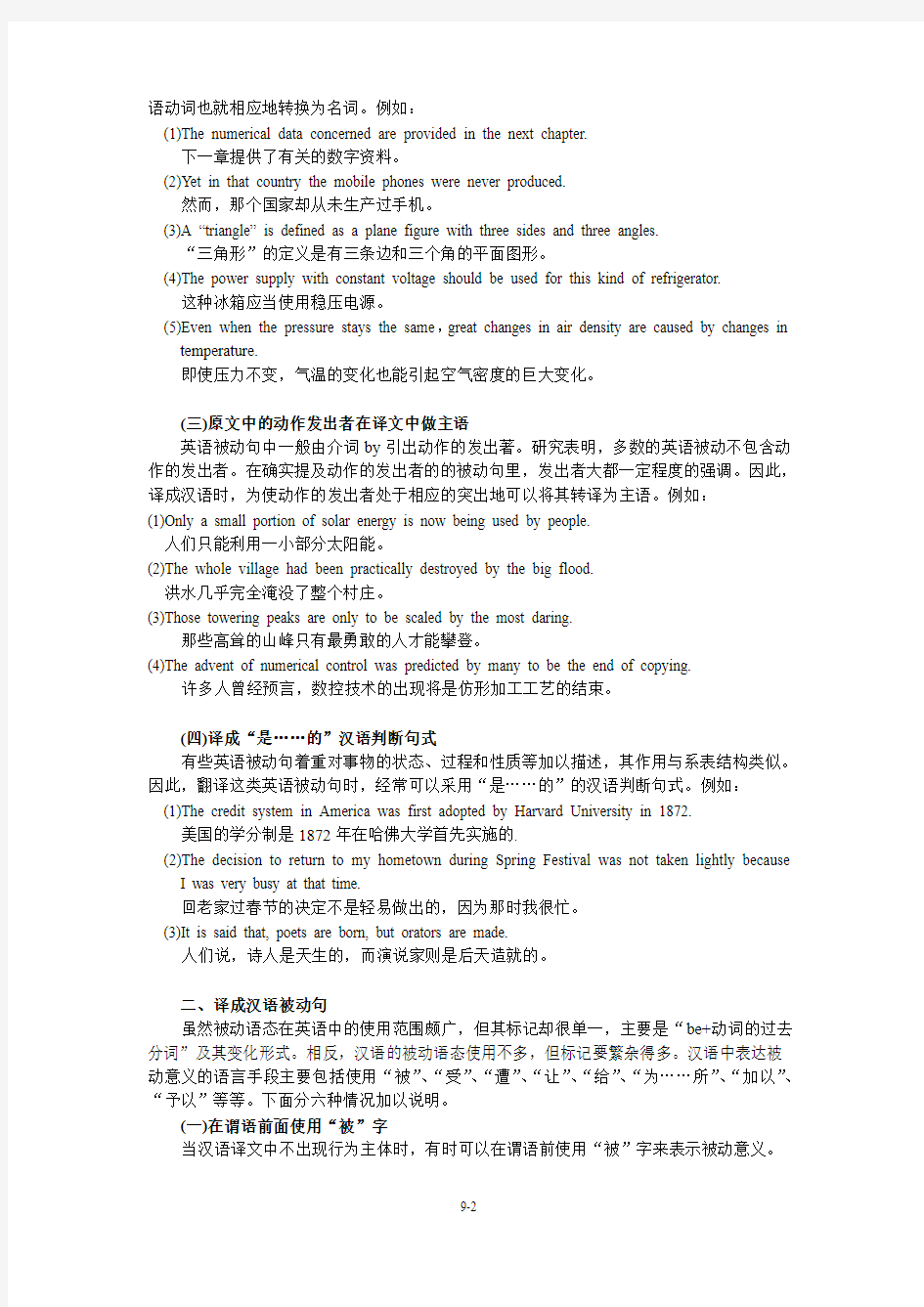科技英语翻译--被动语态的译法1


翻译技巧第九节被动语态的译法
英汉对比研究表明,英语中被动语态的使用极为普遍,尤其是以科技英语为主。这是英语区别于汉语的显著特点之一。在英语中,大凡为了强调受事,以突出其鲜明位置,而无需提及主动者、无意点明主动者、无从说出主动者,为了上下文的衔接与连贯等等,或是出于礼貌措辞圆通等方面的考虑不愿说出动作的执行者是谁的,往往都采用被动语态。例如:(1)When will we be interviewed?
我们什么时候来参加面试呢?
(2)New British and American films are often shown to English major juniors.
常给英语专业的三年级的同学放映新的英美电影。
(3)The happy man cannot be harried.
吉人自有天相。
(4)You are cordially invited to a dinner party to be given at the Workers’ Club in Xidan at 7 P. m.
Nov. 23.
谨定于11月23日晚上7时在西单工人俱乐部举行晚宴,敬请光临。
(5)The plan was especially supported by those who wished to have more chance to speak French. 这个计划特别受到愿多有机会说法语的人的支持。
在英语中,被动结构能给人以间接、客观的印象,因而在科技文献、政论文和新闻报道等文体中使用尤为频繁。相比之下,被动语句在汉语中的使用范围小得多。主要原因在于,在历史上,汉语被动语句主要用来表达对主语来说是如意或不希望发生的事情。现代汉语的这种限制虽然在西方语言的影响下有所动,被动句式有时也用来表达中性甚至希冀之事,但是汉语采用的主要是语义型句式,大多数被动意义并不一定非得通过被动语句来表达,而可以通过形式上主动、语义上被动的句式予以体现。英语和汉语在被动语态使用上存在的这种差异决定了英汉翻译中语态转换的必要性。
一、译成汉语的主动句
英语被动结构的句子译成汉语主动句包括以下几种不同情况:
(一) 原文中的主语在译文中仍做主语
在翻译英语被动句时,如果没有必要指出施事者,有时可以按原文语序翻译成汉语主动句,原文的主语仍然充当译文的主语。因此,要把英语译成纯正地道、的汉语,译者往往需要采用“受事主语+谓语动词”的句式。例如:
(1)The whole country was armed against foreign invaders in a few days.
几天之内,整个国家就武装起来了,准备抵抗外来侵略者。
(2)The transistors are widely used in communication system.
晶体管广泛用于通讯设备中。
(3)On our domestic stations,events in Iraq were dismissed briefly.
在我们国内电台的广播中,伊拉克事件只轻描淡写地报道了一下。
(4)Water can be changed from a liquid into a gas.
水能从液体变为气体。
(5) The old woman had been stricken with a heart attack earlier in the morning.
清晨,老太太的心脏病发作了。
(二)原文中的某一部分在译文中做主语
英语中有些被动句译成汉语时,可以将原句中的某个适当的成分转译成主语。经常转译为主语的成分包括一些地点状语或其中的名词以及某些谓语。当然,谓语转译成主语时,谓
语动词也就相应地转换为名词。例如:
(1)The numerical data concerned are provided in the next chapter.
下一章提供了有关的数字资料。
(2)Yet in that country the mobile phones were never produced.
然而,那个国家却从未生产过手机。
(3)A “triangle” is defined as a plane figure with three sides and three angles.
“三角形”的定义是有三条边和三个角的平面图形。
(4)The power supply with constant voltage should be used for this kind of refrigerator.
这种冰箱应当使用稳压电源。
(5)Even when the pressure stays the same,great changes in air density are caused by changes in
temperature.
即使压力不变,气温的变化也能引起空气密度的巨大变化。
(三)原文中的动作发出者在译文中做主语
英语被动句中一般由介词by引出动作的发出著。研究表明,多数的英语被动不包含动作的发出者。在确实提及动作的发出者的的被动句里,发出者大都一定程度的强调。因此,译成汉语时,为使动作的发出者处于相应的突出地可以将其转译为主语。例如:
(1)Only a small portion of solar energy is now being used by people.
人们只能利用一小部分太阳能。
(2)The whole village had been practically destroyed by the big flood.
洪水几乎完全淹没了整个村庄。
(3)Those towering peaks are only to be scaled by the most daring.
那些高耸的山峰只有最勇敢的人才能攀登。
(4)The advent of numerical control was predicted by many to be the end of copying.
许多人曾经预言,数控技术的出现将是仿形加工工艺的结束。
(四)译成“是……的”汉语判断句式
有些英语被动句着重对事物的状态、过程和性质等加以描述,其作用与系表结构类似。因此,翻译这类英语被动句时,经常可以采用“是……的”的汉语判断句式。例如:
(1)The credit system in America was first adopted by Harvard University in 1872.
美国的学分制是1872年在哈佛大学首先实施的.
(2)The decision to return to my hometown during Spring Festival was not taken lightly because
I was very busy at that time.
回老家过春节的决定不是轻易做出的,因为那时我很忙。
(3)It is said that, poets are born, but orators are made.
人们说,诗人是天生的,而演说家则是后天造就的。
二、译成汉语被动句
虽然被动语态在英语中的使用范围颇广,但其标记却很单一,主要是“be+动词的过去分词”及其变化形式。相反,汉语的被动语态使用不多,但标记要繁杂得多。汉语中表达被动意义的语言手段主要包括使用“被”、“受”、“遭”、“让”、“给”、“为……所”、“加以”、“予以”等等。下面分六种情况加以说明。
(一)在谓语前面使用“被”字
当汉语译文中不出现行为主体时,有时可以在谓语前使用“被”字来表示被动意义。
例如:
(1) The project on air pollution was shelved because of shortage of money.
空气污染的研究计划因资金短缺被搁置下来了。
(2)The heated water is thus cooled as it goes through the radiator.
热水流过冷却器时就被冷却了。
(3)At the end of last year he was fired for incompetence.
去年年底,他因自己无能而被解雇了。
(4)This shopping mall was enjoined from using false advertising.
这家大型购物中心被禁止使用虚假广告。
(5)Up to now, sulfur dioxide has been regarded as one of the most serious of these pollutants.
到目前为止,二氧化硫一直被看作是这些污染物中最严重的一种。
(二)在谓语动词前省略“被”字
在行为主体没有出现的汉语被动句中,当其被动意义非常明显时,汉语习惯上不使用“被”字。比如汉语说“作业做完了”,而不说“作业被做完了”。这种不使用“被”字的被动句在形式上与主动句相似,但意义上却是被动的。在现代汉语中,不使用“被”字的被动句比使用“被”字的要多得多。例如:
(1)This kind of instrument must be handled with great care.
这种仪器操作要非常小心。
(2)All these factors ought to be taken into consideration.
所有这些因素都应当考虑。
(3)So far no conclusion has been arrived at.
到目前为止还没有得出结论。
(4)In this sense, bad things can be turned into good things.
从这一点上来说,坏事也可以变成好事。
(5)Accompanying the visible light, a great deal of invisible radiation, or radiant heat, is emitted.
大量的不可见的辐射热,伴随着可见光释放出来。
(三)在行为主体前使用“被”、“给”等字
在这类汉语句子中,在“被”、“给”等字后面,动词的前面,有一个名词,也就是行为主体,作为该动词的逻辑主语。例如:
(1)The second half of her words was torn away by the strong wind.
她的后半句话,给大风刮得听不见了。
(2)That schoolboy was knocked down by a bus when he was crossing the street.
那个男生在穿过街道时让一辆公共汽车撞倒了。
(3)All around, the mountains were black with oil, and some were hidden by gas and
drifting Oil spray.
四周,由于蒙上了一层油,山峦是黑色的,有的山峦则被天然气和在风中飘洒的
喷油遮挡住了。
(四)使用“为……所”句型
(1)As soon as all the facts have been found out,we can begin to formulate a theory.
一旦所有的事实为人们所发现,理论即可形成。
(2)This system of units is commonly used by most mathematicians.
这种单位制通常为大多数数学家所采用。
(3)In his late thirties he was almost knocked down in his despondency of the unsuccessful career.
在他三十多岁时,由于事业上的挫折,他几乎为失意所毁。
(4)These views of Mao Zedong and Deng Xiaoping have now been adopted by every Chinese who hopes China to be prosperous and strong.
毛泽东和邓小平这种观点,现在已经为每一个希望中国富强起来的中国人所接受。
(五)使用“加以”、“予以”字样
(1)This problem will be discussed in the next meeting.
这个问题将在下次开会时予以讨论。
(2)The proposal will be examined by a special committee.
这项提议将由一个特别委员会加以审查。
(3)The details of the interior will be further fitted up to match the exterior.
室内将进一步加以装修,使之与室外装饰浑然一体。
(4)The man-made satellite must be carefully inspected before launching.
人造卫星在发射前必须仔细地予以检查。
(六)使用“(遭)受”字样
(1)She was policed by her boss’ cops.
她受到她老板雇用的警察的监督。
(2 ) The American scholars were given a hearty welcome in Tsinghua University.
这些美国学者在清华大学受到热烈欢迎。
(3)She was not affected by the noise outside and was absorbed in reading her novel.
她不受外面嘈杂声的影响,完全沉浸在她的小说中。
(4)The American President Bill Clinton was received with great honor and much kindness when he paid a visit to China.
美国总统比尔. 克林顿在中国访问期间受到中方非常隆重和盛情的接待。
(5)Our foreign policy is supported by the people all over the world.
我们的外交政策受到全世界人民的支持。
三、译成汉语无主句
英语中有许多被动句未提及施动者,这种句子常常可以译成汉语的无主句。
(一)将原文中的主语译成宾语,置于动词之后
(1)This kind of unpleasant noise must be immediately put an end to.
必须立即终止这种令人讨厌的噪音。
(2)A pistol had been found close to the murdered old man.
在被害老人的旁边发现了一把手枪。
(3)Nearly 600 tons of accumulated refuse and dregs were removed altogether in six days.
六天内运走了近六百吨堆积的垃圾和渣土。
(二)将原文中的主语译成宾语,置于动词之前
(1)The tall building had been practically destroyed by the big fire last year.
去年的那场大火使这座高楼几乎全部毁灭。
(2)Kissinger was alarmed by China’s first atomic blast in October, 1964.
1964年10月,中国爆炸了第一颗原子弹,这把基辛格吓了一跳。
(3)And the astonishing thing is that this most dangerous operation was organized by a young
attractive twenty-one-year-old British girl, Mary Smith by name.
令人惊奇的是,这个极其危险的作战行动是由一个年轻貌美的英国姑娘组织的,她名叫玛丽·史密斯,年仅二十一岁。
(三)主语和谓语合译
英语中有些动词词组中含有名词,变成被动语态时将该名词用作了主语,这是一种特殊的被动语态。译成汉语时可以把主语和谓语合在一起翻译,译成汉语无主句的谓语。例如:
(1)Care should be taken at all times to protect these sophisticated instruments from dust and
damp.
应当始终注意保护这些精密仪器,不使其沾染灰尘,不让他们受潮。
(2)Use is made of an electronic computer in solving this complicated problem.
在解决这一复杂问题时,利用了电子计算机。
四、英语常用被动句型的汉语习惯译法
(一)增补一些含泛指意义的词充当主语
如果英文句子中没有表示施动者的现成词语,又不宜将其他成分转译成主语,译成无主句也不合适,那么在翻译这种英语被动句时,可以依据逻辑意义增补某些泛指性词语做主语,比如“有人”、“我们”、“人们”、“大家”,等等。例如:
(1)Shakespeare is known to be one of the most famous playwrights in British history.
大家知道,莎士比亚是英国历史上最伟大的剧作家之一。
(2) Do not be surprised if you are offered mineral water, milk or coffee with a meal.
用餐时如果人家给你提供矿泉水、牛奶或咖啡,你用不着诧异。
(3)She was seen to enter the flat about the time the crime was committed.
有人看见她大致在案发时进入了那所公寓。
(4) Electrons n旭known to be exceptionally small negatively charged particle.
大家知道,电子是极其微小的带负电荷的粒子。
(5)Suggestions were made to present the trade terms in another manner for the purpose of
easier reading and understanding last year.
去年有人建议,采用另一种方式表达贸易术语,以便更加易于阅读和理解。
(二)以it作形式主语的被动语态句型的习惯译法
在英语中,以it作形式主语的被动句型在各类文章中比比皆是,汉译时一般均按主动结构译出。有时不加主语,如It is reported that. . . (据报道);It is said that… (据说);It is supposed that. . . (据推测);It is hoped that… (希望);It has been Droved that. . . (业已证明);It should be noted that… (应当指出);It is assumed that. . . (假设,假定);It cannot be denied that. . . (不可否认);It may be said without fear of exaggeration that…(可以毫不夸张地说);It is estimated that… (据估计);It must be realized that... (必须了解);It must be kept in mind that… (必须记住);It must be admitted that… (必须承认);It must be pointed that… (必须指出);It will be seen from this that. . . (由此可见);有时则需要增补一些泛指性词语做主语,包括“有人”、“我们”、人们”、“大家”等等。现先将这类需增补主语的常见句型及其习惯译法列举如下:It is well known that… 大家知道(众所周知)
It is admitted that…人们(大家) 承认
It is stressed that. . . 有人强调说
It is suggested that. . . 有人建议
It is believed that. . . 有人相信(认为)
It is regarded that. . . 人们认为
It is thought that. . . 人们(有人) 认为
It is taken that. . . 人们(有人) 认为
It is felt that. . . 人们(有人) 认为(感到)
It is generally accepted that. 大家公认(一般认为)
It is pointed out that. . . 有人指出
It is noticed that. . . 人们注意到
It is found out that. . . 人们发现
It is alleged that. . . 人们断言
It is declared that. . . 人们宣称(据宣称)
It is understood that. . . 人们理解(不用说)
It has been objected that. 有人反驳
It is claimed that. . . 有人(人们) 主张(要求)
It is asserted that. . . 有人主张(断言)
下面再看一些以it作形式主语的被动语态句型在汉语句子中的翻译情况:
(1)It is well known that gunpowder is one of the four inventions of the ancient Chinese
people.
大家知道,火药是中国古代的四大发明之一。
(2) It is felt that her plans for a film star had all been merely a day dream.
有人说她那些当电影明星的计划全都是白日梦罢了。
(3)It is thought that Poland will repay the loans by exporting some of the new products back to the West.
有人认为,波兰将通过向西方出口这些新产品的部分产品来偿还贷款。
(4)It is rumored that the accident was due to negligence.
据谣传. 那场事故是由于疏忽而造成的。
(5)It is believed that many people spend up to five years of their lives in that tedious,
stressful but unavoidable process known as waiting.
有人认为,许多人一生中在乏味而令人厌烦、却又无法避免的等待上所耗费的时间竞达五年之多。
在实际的英汉翻译过程中,被动语态的翻译往往是以上各种方法的综合、灵活运用。
